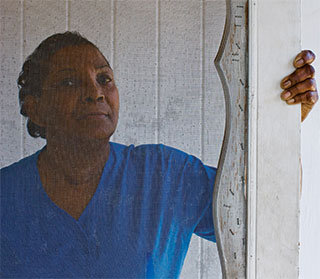Ever since its contract employee Jamie Leigh Jones went public with allegations that in 2005, she was drugged and gang raped by some of her co-workers in Iraq and then detained in a storage container, KBR/Halliburton has fought her efforts to sue in a public courtroom. Jones had been forced to sign a mandatory arbitration agreement as part of her employment contract, which required her to bring any work-related claims before a private arbitrator hired by KBR rather than a jury. Jones fought the agreement and in September, prevailed in one of the most conservative federal appeals courts in the country. Her story persuaded Sen. Al Franken (D-MN) to pass legislation to ban defense contractors from using arbitration agreements in cases of sexual assault.
But last week, KBR signaled its intention to continue fighting Jones, no matter how bad it makes the company look. On Jan. 19, it petitioned the Supreme Court to overturn the 5th Circuit Court of Appeals decision allowing Jones to press her case in a civil court rather than in arbitration. Among its many arguments in favor of a high court hearing: that Jones is a relentless self-promoter who has “sensationalize[d] her allegations against the KBR Defendants in the media, before the courts, and before Congress.” In its petition, KBR is clearly miffed about the Franken Amendment, which it credits Jones with getting passed. KBR also suggests that much of Jones’ story is fabricated. The company says in a footnote, “Many, if not all, of her allegations against the KBR Defenandants are demonstrably false. The KBR Defendants intend to vigorously contest Jones’s allegations and show that her claims against the KBR Defendants are factually and legally untenable.”
It’s a curious argument to make in a petition asking to keep the case proceedings confidential (a benefit of mandatory arbitration that KBR claims many assault victims really appreciate). After all, if KBR has been wrongly accused in such public forums as Congress and the media, wouldn’t it be better off fighting the charges someplace it could be publicly vindicated? And if Jones’ story is really false, why has KBR waited five years to respond? KBR must be pretty worried that lots of other women are getting in line to sue now that Jones has made it easier for them, a potentially expensive disaster. Threatening to disparage an alleged rape victims seems more scare tactic rather than good legal strategy. But KBR’s legal strategy has been pretty loony from the get-go. Rather than try to defend an indefensible arbitration system in a case with a compelling victim, KBR would have done far better to simply pay Jones to shut up and go away a long time ago, before she won Al Franken’s heart. At this point, even if it wins the court battle, the company is going to lose the PR fight.

















